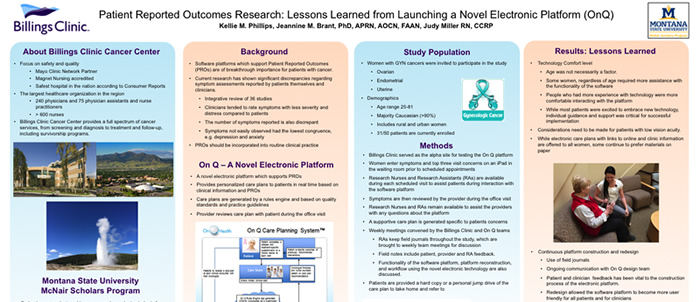
My name is Kellie Phillips. I am a BSN student at Montana State University and have been working with Dr. Jeannine Brant at Billings Clinic (BC) for almost a year and a half on a project with Carevive Health, in which I became completely enamored with.
How did I become involved with research as a student nurse? I am very lucky to be a part of the McNair Scholars Program at MSU. This is a program that prepares you for graduate school and offers a research opportunity. Research is really exciting to me, particularly with Dr. Brant as my research mentor. Women’s health is a passion I have developed over the past few years and the Carevive Health software platform project could have not come to Billings Clinic at a better time. During the Oncology Nursing Society (ONS) 40th Annual Congress opening ceremonies, the phrase “transforming the future,” was mentioned more than once. I truly feel technology such as Carevive Health’s software which drafts personalized care plans for care teams to deliver to their patients is the future of care management.
About the Poster
Current literature supports the need to consider patient-reported outcomes in caring for patients, and that we need to close the discrepancy of symptom assessment reported by patients versus clinicians to improve patient Quality of Life. The Carevive Health electronic platform collects electronic patient reported outcomes (e-PRO) and clinical data, which is mapped to evidence-based supportive care guidelines, and generates personalized, patient-facing care plans for care teams to deliver to patients. Our population for this study was strictly GYN malignancy, ovarian, endometrial and uterine cancers. Patients are screened weekly capturing a wide age range of women, 25-81, majority Caucasian, from rural and urban areas throughout Montana, Wyoming and even North Dakota, with a sum of 36 women currently enrolled and a target sample size of 50.
Methods
Billings Clinic has served as an alpha site for testing the Carevive Systems’ electronic platform. At our location, the platform allows women to enter on an iPad symptoms and their top three visit concerns while in the waiting room prior to scheduled appointments. Research Nurses and Research Assistants, such as myself, are available during each scheduled visit to assist patients during the interaction with the software platform. This allowed time for questions or clarifications. The provider then reviews the symptoms during the office visit, again research nurses or RA are available to assist the providers with any questions or concerns about the platform. A supportive care plan is generated specific to the patient’s concerns. Patients are provided with a USB drive that they can take home to review the care plan material or a hard copy provided to review material at home.
Results: Lessons Learned
There was a true technology comfort level factor with the launch of Carevive Health at Billings Clinic. Age was not necessarily a factor, some women regardless of age required more assistance with the functionality of the software. Women that were technically savvy were more comfortable with the platform. Although most women expressed excitement in embracing a new technology, individual guidance and support was critical for successful implementation. Considerations need to be made for women with low visual acuity. While electronic care plans with links to online and clinic information are offered to all women, some continue to prefer materials on paper. Patients who interacted with the platform gave continuous constructive feedback for redesign. Both patient and clinician feedback has been vital to the development process and capabilities of the Carevive Health electronic platform. Continual enhancements of the Care Planning System (CPS) platform based on user feedback has been made the, and is now more user friendly for all patients and clinicians.
Future Implications
We will be able to evaluate symptom trends over time across GYN oncology patients and look at patient-reported outcomes of prescribed symptom recommendations. These outcomes can drive future supportive care guidelines. Remote symptom screening will become possible, which is critical for those living in rural areas of Montana. Individualized supportive care plans based on these screening will be generated and available regardless of the location of the patient.
Audience feedback was limited after my presentation at ONS, the ePoster sessions were five minutes and the next poster was right after. I was eager for questions, I could not wait to deliver my poster presentation , share my experience with Carevive Health and what I learned throughout the process. As a BSN student presenting at ONS Congress, it is a true honor to present a project that I full heartedly am passionate about, and working with an outstanding team at Carevive Health, has been instrumental in my educational and personal growth.
Poster Presentation

Patient Reported Outcomes Research: Lessons Learned from Launching a Novel Electronic Platform (Carevive) by Kellie M. Phillips, Jeannine M. Brant, PhD, APRN, AOCN, FAAN, Judy Miller RN, CCRP
Click to enlarge poster.



